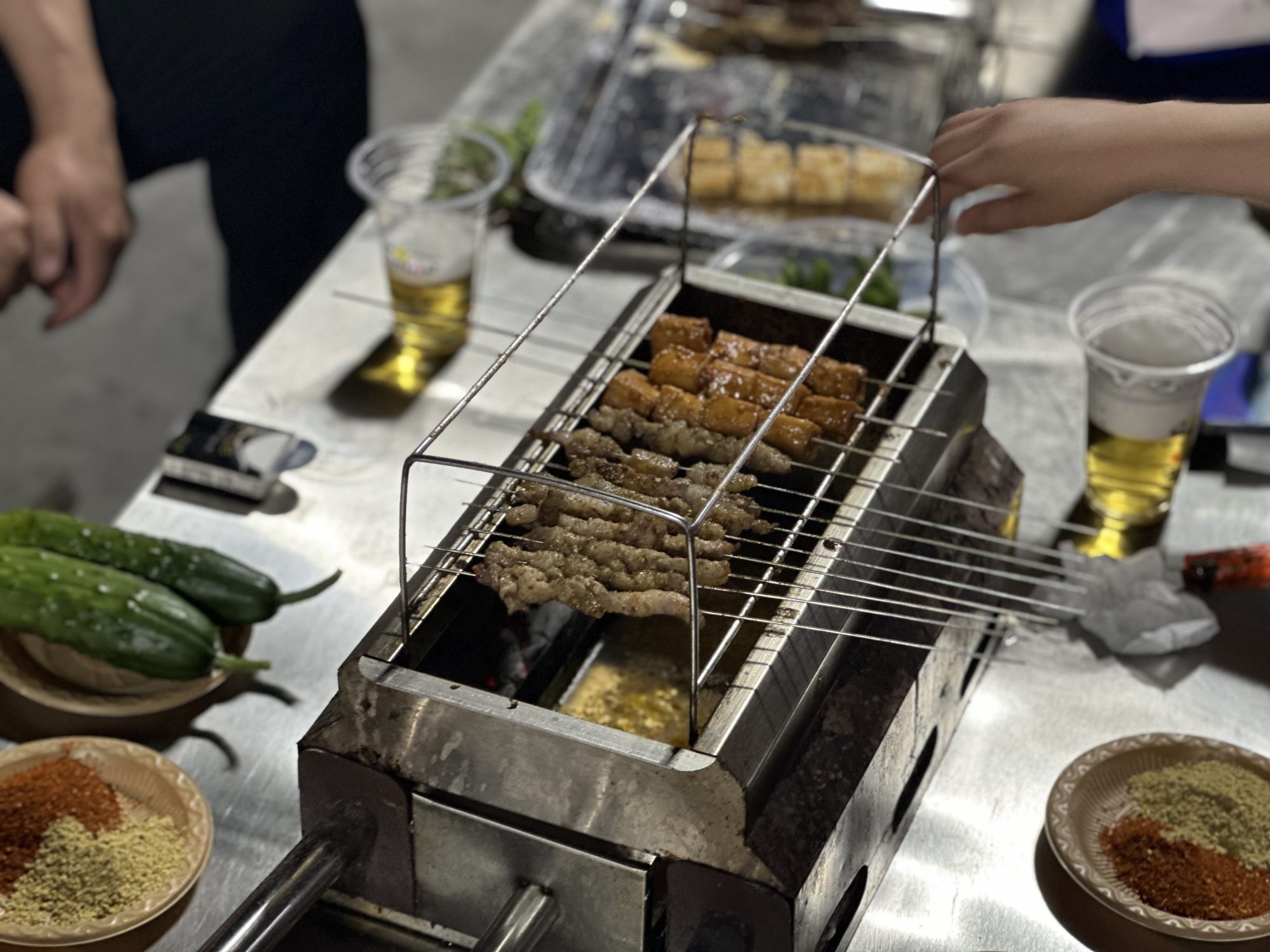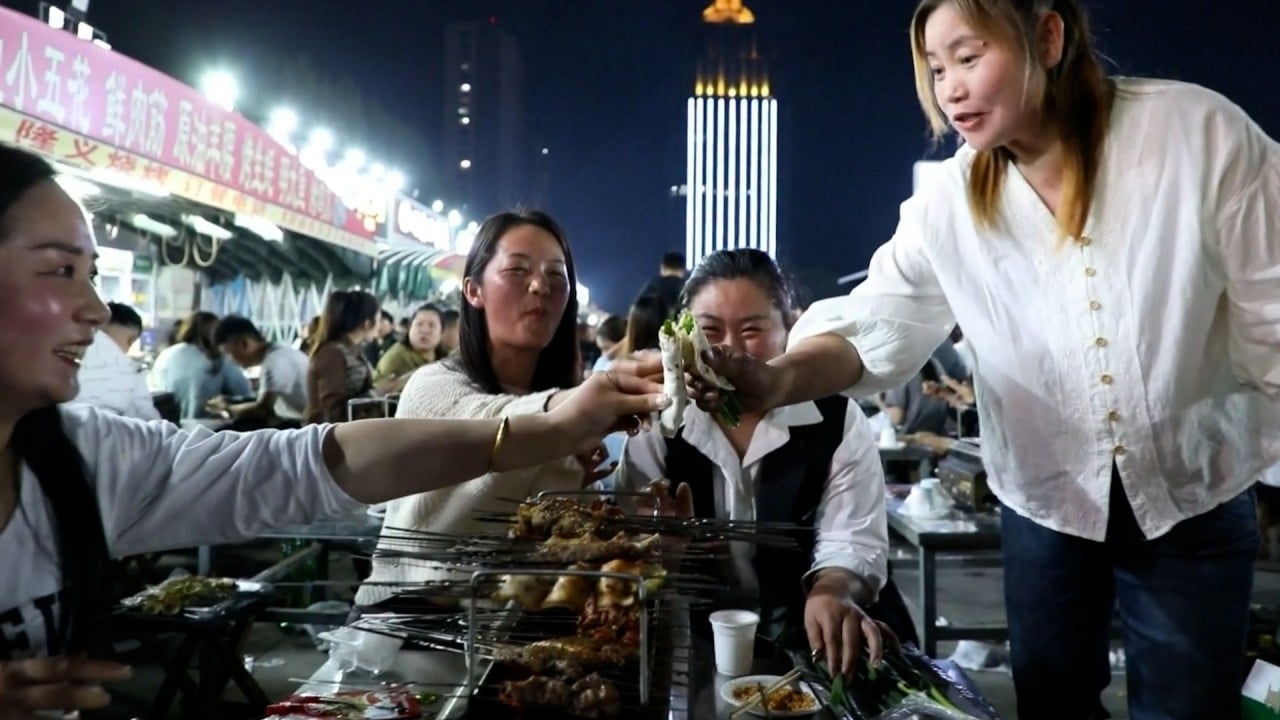
In Zibo, China’s barbecue capital, a distant deadly gas blast puts safety in the spotlight
- Tourists continued to flock to the city during the Dragon Boat festival, looking for a taste of the dining sensation
- More than a thousand kilometres away, people in Yinchuan were coming to terms with a restaurant explosion that killed 31
The music was loud, every restaurant was at capacity and the meat skewers were being devoured as soon as they came off the grill.
“This is how we do it safely,” Zhao Ni, the manager of a 30-year-old barbecue chain in Zibo, said as she set up a small metal brazier in front of her guests.
“We don’t even use gas for our barbecue, we use charcoal. It is our tradition.”
The deadly explosion in Yinchuan, in Ningxia, on Wednesday was caused by a leak from a liquefied gas tank.
The effects of the blast were felt not only in Yinchuan, where authorities apologised for the tragedy, but throughout the country, with President Xi Jinping ordering a nationwide campaign to identify and remedy fire hazards.
That included checks in Zibo, a city in the eastern province of Shandong.
Provincial and municipal governments embarked on a new round of safety inspections, saying they would investigate “barbecue shops, hotels, restaurants and night market stalls”.
For Zibo, much is riding on safety and keeping the customers coming.
The city of 4.7 million people is riding a wave of social media interest that has propelled it to fame as the hot destination for barbecue food.
This year, during each national holiday, tourists have flooded into Zibo to sample the grilled offerings that everybody is talking about.
Over the May “golden week” holiday, for example, travel-related bookings to Zibo were up more than fourfold from the same time in 2019, before the Covid-19 epidemic, according to online travel booking platform Ctrip.
The hope is that the boom will enable the industrial city to overcome the decline in its economic mainstay, the chemicals industry.
To that end, Zibo has introduced measures such as free parking throughout the city and built a new outdoor barbecue site that hosts over three dozen barbecue restaurants.
One of the restaurants is a family business run by a Zibo resident who would only identify himself by his surname Liu.
Liu, 28, said safety was clearly a big concern for the municipal administration.
“Even before this news of the explosion, the level of safety precautions taken in our city in the past few months was unprecedented,” he said.

Liu said since his restaurant opened in April, the government had conducted a series of daily inspections, looking at everything from safety to hygiene and meat quality.
After the explosion in Yinchuan, Liu and his staff were immediately told to adopt various safety measures and take first aid classes.
“It was quite a miracle that our city has shot to fame all of a sudden, I think many of us are very serious about protecting our hard-earned reputation,” he said.
“We know the local government supports our business, so we are not worried about a crackdown following the safety checks.”
But there were other things to worry about, Liu said.
When the city shot to prominence a few months ago, Liu, like many, wondered how long it would last.
China’s barbecue boomtown: how Zibo fanned its fortunes with a food festival
Meanwhile, local governments from other provinces, such as Henan and Jiangsu, wondered if they could replicate the success.
Other localities sent cadres on “study tours” to try to understand the phenomenon and while economists held academic seminars to discuss the factors at play.
The interest highlights the pressure that Beijing and other local governments are under to find ways to drive domestic spending after three years of Covid measures.
While retail sales continued to grow in May, rising 12.7 per cent year on year, that was down from the 18.4 per cent gain in April.
And although China’s restaurant sector is still the best performer in terms of consumer spending, its growth is also slowing, according to data from the National Bureau of Statistics.
Even before this news of the explosion, the level of safety precautions taken in our city in the past few months was unprecedented
Renmin University finance professor Zhao Xijun said Zibo had managed to succeed because the city found a way to turn a “local delicacy” into a national brand.
The low cost of barbecue meals also meant it would appeal to a wider base of the population, he said.
But that continued success would rest in part on the government communicating well with business operators about their safety issues.
“It is important that these precautions are done to boost overall consumer confidence,” Zhao said. “But also it should be well communicated so normal business operations are not disrupted.”
For now, the diners keep coming, although in smaller numbers, according to taxi drivers and restaurant owners.
Liu said he was expecting the frenzy to last until the next big national holiday in the first week of October.
“When it gets cold, barbecue season will be over,” Liu said. “We can only hope that we have provided our service well, so people will come back again in spring.”

But two of his customers, a couple in their 50s, may not bring repeat business.
The couple made the four hour-drive from Tianjin after watching videos on the Chinese app Douyin.
The couple said their 25-year-old daughter, who only visited the place a week ago, also suggested they come for holiday to get a taste of the trend.
“Barbecue is barbecue. It’s more like a ‘been there, done that’ for me. It’s not bad but it’s not like I will come back for a second time,” the husband said.


